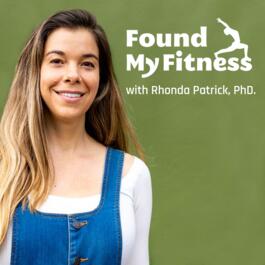
Dr. David Sinclair on Informational Theory of Aging, Nicotinamide Mononucleotide, Resveratrol & More
David A. Sinclair, PhD, is a professor in the Department of Genetics at Harvard Medical School and co-director of the Paul F. Glenn Center for the Biological Mechanisms of Aging. He is the co-founder of the journal Aging, where he serves as co-chief editor. Dr. Sinclair's work focuses on understanding the mechanisms that drive human aging and identifying ways to slow or reverse aging's effects. In particular, he has examined the role of sirtuins in disease and aging, with special emphasis on how sirtuin activity is modulated by compounds produced by the body as well as those consumed in the diet, such as resveratrol. His work has implications for human metabolism, mitochondrial and neurological health, and cancer. In this episode, we discuss... 00:17:59 - How caloric restriction, fasting, and exercise increase levels of a molecule called NAD+ and how this activates sirtuins, a family of genes involved in longevity. 00:21:47 - How NAD+ levels and sirtuin activities decrease with age, and how animal studies suggest that raising cellular NAD+ levels can trick the body into thinking it is younger. 00:23:03 - How resveratrol enhances the binding of sirtuins to NAD+ thus making sirtuins more easily activated for a longer period. 00:27:36 - We also discuss Steve Horvath's epigenetic aging clock, which measures DNA methylation groups, and how they may play a role in widespread gene regulation, including sirtuin genes, and how NAD+ may participate in resetting the clock. 00:31:54 - How the signal that resets the epigenetic clock in mice involves the Yamanaka factors -- a group of four transcription factors that can reprogram an adult cell to become a pluripotent stem cell that can form any cell type. 00:46:48 - How resveratrol is a xenohormetic compound and is produced when grape plants are stressed either in response to fungus or lack of water. 00:55:35 - How a phase 2 clinical trial involving people with Alzheimer's disease showed resveratrol improved cognitive function, improved cerebrospinal fluid amyloid beta levels, lowered markers of activated microglia, and more. 00:58:03 - How both nicotinamide riboside and nicotinamide mononucleotide have been shown to improve cognitive function and brain pathology in mice that have been engineered to get a disease similar to Alzheimer's disease. 01:06:19 - How older mice that were given nicotinamide mononucleotide experienced delayed aging in the liver, muscle, immune cells, eyes, and bones, but those that took a lower dose had improved mitochondrial function and enhanced physical performance. 01:01:22 - How there may be challenges in translating animal studies on nicotinamide riboside and nicotinamide mononucleotide to humans particularly due to the need to determine the dose required to promote health benefits. And so much more! Click here to get this episode's show notes and transcript Watch this episode's highlights on the FMF Clips channel Get early access with the premium members early access podcast feed, monthly Q&A sessions, an exclusive bi-weekly science digest email, and more! Click here to get started. Submit your raw genetic data to get the latest version of the genetic report at foundmyfitness.com/genetics.
From "FoundMyFitness"




Comments
Add comment Feedback